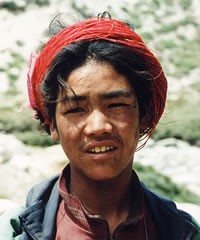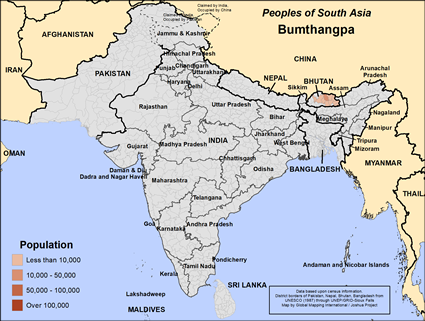Several thousand people living in east-central Bhutan belong to the Bumthang ethnic group. They take their name from their main habitation, Bumthang District, and they call themselves Bumthangpa ('People of Bumthang '). The Bumthang language 'is spoken on either side of the lofty Thrumshingla extending as far east as Senggor and as far west as Trongsa. Bumthang is most closely related to Kheng and Kurtop. The two peaks that loom prominently to the south of Senggor mark the boundary between the Kheng and Bumthang speaking areas.' The Bumthang also spill over into the eastern part of Trongsa District.
Bumthang is believed to have been the first inhabited place in Bhutan. Its ancient capital of Jakar (also spelt J 'aga) lies at the foot of the Choskhor Valley and is a major trading center. Its population of about 2,000 swells on market days, as people from various ethnic groups converge on the town. It was also the location for many fierce battles in history, especially in the 1600s when Tibetan armies invaded Bhutan to bring it under the rule of Lhasa. A small pagoda near the bridge outside Bumthang marks the spot where a Tibetan general's head was buried after the locals defeated his army during one of these 17th-century raids.
The Bumthangpa language is part of the Eastern Tibetan branch of the Tibeto-Burman family. There are eight languages in this branch, all of which are spoken only in Bhutan. One linguist says, 'Although it could be argued that the two languages Kheng and Kurtop are dialects of Bumthang on grounds of mutual intelligibility, there are essential differences between the phonologies of Kheng and Kurtop on one hand and that of Bumthang on the other. Moreover, the speakers of these three languages identify strongly with their respective homelands in Bumthang, Kurto and Kheng.' Bumthang is believed to be like the Monpa language spoken in Cuona County of Tibet. It reportedly has 92 per cent lexical similarity with Kheng, but just 47 per cent to 52 per cent with Dzongkha (Bhutan's national language).
Bumthang has been an important Buddhist center for centuries. According to legend, 'when the lamas assembled in about 1549 to select a site for a monastery, a big white bird rose suddenly in the air and settled on a spur of a hill. This was interpreted as an important omen, and the hill was chosen as the site for a monastery and for Jakar Dzong, which roughly translates as "castle of the white bird". The site chosen for Jakar Dzong is a picturesque location overlooking the Choskhor Valley. The current structure was built in 1667 and is said to be the largest dzong in Bhutan, with a circumference of more than 1500 meters.' An earthquake in 1897 severely damaged the monastery, but it still operates as an important Buddhist center, especially in the winter months when many monks take up residence.
There are a small number of scattered Bumthangpa Christians. They have faced much discrimination from their communities, but they have remained faithful to the Lord Jesus.
Pray for gospel workers to catch a vision for reaching the Bumthangpa people for Jesus and that in God's sovereign timing their hearts would be open and ready to follow him.
Pray for Jesus movements to bless extended families so the gospel will spread rapidly among this people group.
Pray for the spiritual lives of the Bumthangpa people to become fruitful as they follow Christ.
Pray for the lives and culture of the Bumthangpa people to evidence the rule and reign of the Kingdom of God as they open to the gospel, and for the beauty of Jesus to be seen in them.
Scripture Prayers for the Bumthangpa in Bhutan.
| Profile Source: Joshua Project |











